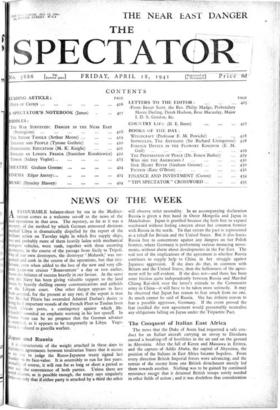span and Russia
It is characteristic of the weight attached in these days to IPI°111atic agreements between totalitarian States that it occurs o no one to judge the Russo-Japanese treaty signed last s undaY on its face-value. It is ostensibly to run for five years. malty. of course, it will run for as long or short a period as y suit the convenience of both parties. Unless there are It clauses, as is possible enough, the treaty says singularly 41e—merely that if either party is attacked by a third the other will observe strict neutrality. In an accompanying declaration Russia. is given a free hand in Outer Mongolia and Japan in Manchukuo. Japan is gratified because she feels free to expand southward without feeling concern about her common frontier with Russia in the north. To that extent the pact is represented as a rebuff for Britain and the United States. But it also leaves Russia free to concentrate against any dangers on her Polish frontier, where Germany is performing various menacing move- ments, without alarm about developments in the Far East. The real test of the implications of the agreement is whether Russia continues to supply help to China in her struggle against Japanese aggression. If she does do that, in common with Britain and the United States, then the hollowness of the agree- ment will be self-evident. If she does not—and there has been some friction quite independently between Russia and Marshal Chiang Kai-shek over the latter's attitude to the Communist army in China—it will have to be taken more seriously. It may be observed that Japan has reason to fear attack from no one. As much cannot be said of Russia. She has definite reason to fear a possible aggressor, Germany. , If the event proved the fear justified the new agreement would presumably neutralise any obligations falling on Japan under the Tripartite Pact.


























